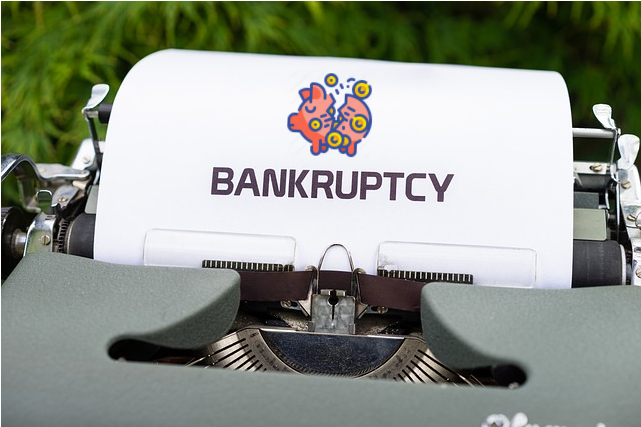WHY BANKRUPTCY IS NOT THE ANSWER.

Bankruptcy is a legal process whereby individuals or entities who are unable to repay their debts to creditors seek or find relief from most or all of their debts. Bankruptcy is often imposed by a court order usually issued by the debtor. The process of bankruptcy can also begin with a petition filed on behalf of creditors but it rarely ever happens. After the petition is received by the court, all the debtor’s assets will be measured and evaluated to pay back a portion of the debt.
Although filing for bankruptcy provides the debtor with a fresh start, it also affects their creditworthiness and can cause difficulty for them in the future. When companies or individuals declare bankruptcy, they do so to alleviate them of all their present debts, while this could be beneficial to them at that time because it gives them a blank slate to start afresh, it could also affect their financial abilities in the future. Bankruptcy can appear on a company or individual’s profile for 7–10 years or even more depending on peculiarity. This simply means that at this time, the individual or company’s capacity to borrow is restricted. Borrowing facilities like banks, credit houses, and even investors will likely refuse to commit their financial resources into an entity within a history of bankruptcy.
There are two main types of bankruptcies, Chapter 7 and Chapter 13 bankruptcies.
Chapter 7, is the most common type of bankruptcy. It involves liquidation so most of your outstanding debt is covered and discharged. It is usually approved for entities or people with only a limited amount of income to pay what they owe, usually individuals or small businesses with little or no assets. Chapter 7 bankruptcy allows you to dispose of unsecured debts. It is selling off your assets to repay debts. However, people who have no valuable assets may end up paying no parts of their unsecured debts.
While chapter 13 is known as a reorganization bankruptcy. In this case, a plan is created to repay your creditors from your income or earnings at a percentage you owe them. This repayment can take up to 5 years and must be approved by a court.
ADVERSE EFFECTS OF BANKRUPTCY ON AN INDIVIDUAL OR ORGANIZATION.
1. Difficulty obtaining a loan after bankruptcy.

After an individual or company is declared bankrupt, they end up having low chances of obtaining loans and additional credit from credit facilities. Bankruptcy is considered a taboo on your credit report and having a history of bankruptcy on your report affects how lenders view you. Lenders who are willing to offer bankrupt people may give them higher interest rates or unfavorable terms and conditions. This can be very detrimental and put them under a lot of pressure and stress until at least 7–10 years run out.
2. Job and housing stigma.

After an individual is declared bankrupt, they may have to sell off their assets to settle creditors. These assets may include properties and houses. Thereafter, getting a mortgage could be difficult. Mortgage banks usually turn down applications from bankrupt people because it is believed that they are incapable of handling their bills. This exposes the person to a risk of being homeless and makes it difficult for them to acquire property.
Also, if a bankrupt person re-enters into the job market, his chances of getting a job are very slim. Most private-sector employers usually run background checks including a credit score on their applicants. This could reduce a bankrupt person’s chances of getting a job. However, your current employer is not allowed to dismiss or relieve you of assignments or demote you simply because you are bankrupt. If this occurs, you can sue them for illegal dismissal.
3. Loss of Property and real estate.

A Shelter is one of the basic needs every human must be able to satisfy. However, this need can become difficult to satisfy when bankruptcy occurs. If a person becomes bankrupt and his house is sold to repay his debt, finding an alternative could be hard. Landlords are usually biased and might be hesitant to rent a property to a bankrupt person. In addition to losing their wealth, this loss of property can also cause a lot of emotional trauma for them.
4. Denial of a Tax refund.

A tax refund is a situation that occurs when you pay more taxes than you ought to and so the government refunds you the excess amount due. Any tax refund earned after filing for bankruptcy is for you. However, if the return is for income earned before bankruptcy it becomes part of the bankruptcy estate. Sometimes, bankrupt persons eventually don’t get their tax refunds back due to the complexity of tax laws and this could be detrimental to their finances. Also, some state laws do not have any laws regarding tax refunds for bankruptcy. Hence, most times bankrupt persons eventually forfeit the refund to the state.
IMPACT OF BANKRUPTCY ON CREDIT SCORE AND NON DISCHARGEABLE DEBTS.
A credit score measures a person’s creditworthiness. A high credit score means that a person has high chances to obtain credit loans etc and a low one means that they are not creditworthy and that they may be unable to repay the loan. When a person is declared bankrupt, it instantly reflects on their credit score by drastically reducing it. Hence, lenders and other credit facilities will be hesitant to give out loans to them or may give them loans with a higher interest rate.
On the other hand, non-dischargeable debts are simply debts that cannot be eliminated merely by a bankruptcy proceeding. These types of debts include student loans, most federal, state, and local taxes, money borrowed on a credit card to pay for taxes, and child support or alimony. Hence, even when a person has been declared to be financially incapable of handling all these debts, they still have to pay them.
CONCLUSION
Filing for bankruptcy may seem like the easy way out of a financial fix. In most cases, it is the best option if the person is unable to settle their liabilities. However, the adverse effects of declaring bankruptcy may be harmful to the fate of their finances in the future.
Sources:
